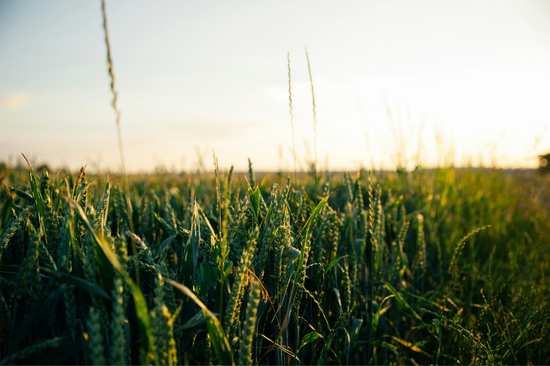What is a balanced fertilizer?
When we talk about “balanced fertilizers”, we are referring to fertilizers that contain equal amounts of macro-nutrients (which have the same NPK numbers). The NPK numbers refer to the ratios of Nitrogen (N), Phosphorus (P) and Potassium (K) in relation to each other. These balanced fertilizers may also be referred to as “all-purpose fertilizers” or “general-purpose fertilizers”.
A 5-5-5, 12-12-12, or 19-19-19 fertilizer would be considered a balanced fertilizer since each of the NPK numbers are the same, meaning the ratios of Nitrogen, Phosphorus and Potassium are identical. Fertilizers with equal NPK numbers are often abbreviated as "triple" fertilizers, as in "triple 5" for 5-5-5, or "triple 19" for 19-19-19 fertilizer.
Why are Nitrogen, Phosphorus and Potassium important?
Nitrogen
Nitrogen is an essential nutrient for healthy plant growth. Nitrogen plays an important role in plant development such as root growth and flowering, so it is vital to ensure adequate nitrogen is present in the soil for optimal results.
Phosphorus
Phosphorus is an abundant element found in plants that helps keep plants healthy and strong. It aids plants with root development, strengthens their cell walls and promotes the formation of flowers and fruits. Phosphorus also helps promote the availability of other nutrients to plants.
Potassium
Potassium is an essential nutrient for all plants, giving them the energy to develop, grow and fight disease. Phosphorus promotes strong roots and helps the plant's absorption of water and other essential minerals.
If you're interested in learning more about fertilizers, you can read more about the basics of fertilization or how to choose the right fertilizer in our blog.
Are Balanced Fertilizers used in the process of "Balanced Fertilizing"?
Balanced fertilizers are not to be confused with “balanced fertilizing”, which actually refers to the process of balancing the macro-nutrients provided by the fertilizer against the needs of the soil and the particular crop(s) being grown.
For an excellent overview of balanced fertilizing applications based on specific soil and crop use, you can download a copy of MSU Extension’s Introduction to Fertilizer Planning Bulletin. It is especially useful for factoring fertilizer costs against expected yields to help ensure profitability.
Benefits of balanced fertilizers
Since each macro-nutrient is present in equal amounts in a balanced all-purpose fertilizer, you can be sure your plants have access to whatever they need. If you have a hobby farm or vegetable garden with a variety of plants, a balanced fertilizer can help provide necessary nutrients no matter what you’re growing, regardless of soil.
If you have been using a balanced all-purpose fertilizer for several seasons, or have been growing the same types of plants in the same locations, it can be very helpful to test your soil to know exactly what may be required to be applied for your particular crop.
Importance of soil testing

You need to be careful when applying fertilizers without knowing what your particular soil or plants may need. What might initially start out as a boost to the health and fertility of your soil, with the application of a balanced all-purpose fertilizer, could actually become toxic to your plants over time. While balanced fertilizers provide everything your plant needs, it can be problematic if excess nutrients build up in the soil. Over-fertilizing can burn and harm roots, killing the plants.
The best way to prevent this is to test your soil and make sure you’re giving your plants exactly what they need. Your local university extension office will likely have soil test kits available to have your soil tested in a lab (usually for a small fee). There are also home garden soil testers like the Rapitest 4-in-1 Soil Tester, as well as soil test kits you can order online and mail-in for analysis. These tests will not only tell you the pH of your soil, but will also identify what nutrients may be lacking and which, if any, may be present in excessive amounts.
Which balanced all-purpose fertilizer is right for you?
Each of the options below are available in standard 50.0 Lb bags. Each bag will cover up to 15,000 square feet. If you're interested in pallet quantities or bulk sales, please email sales@standishmilling.com for quantity and freight pricing, or call us at 989-826-6911.
The Andersons 12-12-12 Fertilizer - 50.0 Lbs
Description
The Andersons 12-12-12 Fertilizer contains a balance of nutrients for added greening power for flowers, shrubs, vegetables and trees. It is an all-purpose granular fertilizer formulated to help improve disease resistance in vegetables and flowers. It can also thicken new and existing lawns.
- 12% Nitrogen
- 12% Phosphorus
- 12% Potassium
- Granular formula
- 50.0 Lb bags
- Covers up to 15,000 sq ft
The Andersons 16-16-16 Fertilizer - 50.0 Lbs
Description
The Andersons 16-16-16 Fertilizer is a popular fertilizer for gardeners looking to give their plants the nutrients they need for healthy growth. It contains a balanced ratio of nitrogen, phosphorus, and potassium that helps plants thrive. It works with a variety of plants and crops, making it a great option for home gardeners and large commercial farmers alike.
- 16% Nitrogen
- 16% Phosphorus
- 16% Potassium
- Granular formula
- 50.0 Lb bags
- Covers up to 15,000 sq ft
The Andersons 19-19-19 Fertilizer - 50 Lbs
Description
The Andersons 19-19-19 Fertilizer is a great all-purpose granular formula that can be used as a starter fertilizer. It is sometimes called a "cure all" fertilizer that has all the essential nutrients. It thickens and strengthens turf. 19-19-19 fertilizer can be applied all season long and is often used as a winterizer.
- 19% Nitrogen
- 19% Phosphorus
- 19% Potassium
- Granular formula
- 50.0 Lb bags
- Covers up to 15,000 sq ft
Applying balanced all-purpose fertilizer
The balanced fertilizer options we've listed here are all granular formulas. While it is possible to apply fertilizer by hand in small contained areas, for larger areas, you will get more even distribution using a spreader specifically designed for this purpose.
The type of spreader you choose will heavily depend on how much area you need to cover. We stock handheld spreaders, chest-mounted spreaders, carried bag spreaders, turf spreaders, pull-behind and vehicle-mounted spreaders (for trucks, tractors, ATVs and lawnmowers).
BONUS: Using fertilizer spreaders to distribute salt and ice melt
In addition to distributing granular fertilizers evenly across a given area, these same spreaders can be used to distribute rack salt as well as other snow and ice melt products on sidewalks, driveways, and parking lots. Using a good turf spreader to put down salt or ice melt can reduce the quantity of salt needed, saving money. It also allows you to transform a treacherous walkway into a safe path, preventing slips and falls, in a fraction of the time it takes to do it by hand.
If you're wondering which type of salt or ice melt to use in your spreader, you can read more about how to melt ice on driveways or which salt is best for driveways.
Conclusion
We hope this post has helped you determine if a balanced all-purpose fertilizer would suit your needs and which one would work best for your particular situation. If you still have questions about which type of fertilizer may be better for your lawn, field or garden, don’t hesitate to contact us. One of our team members would be happy to help!








